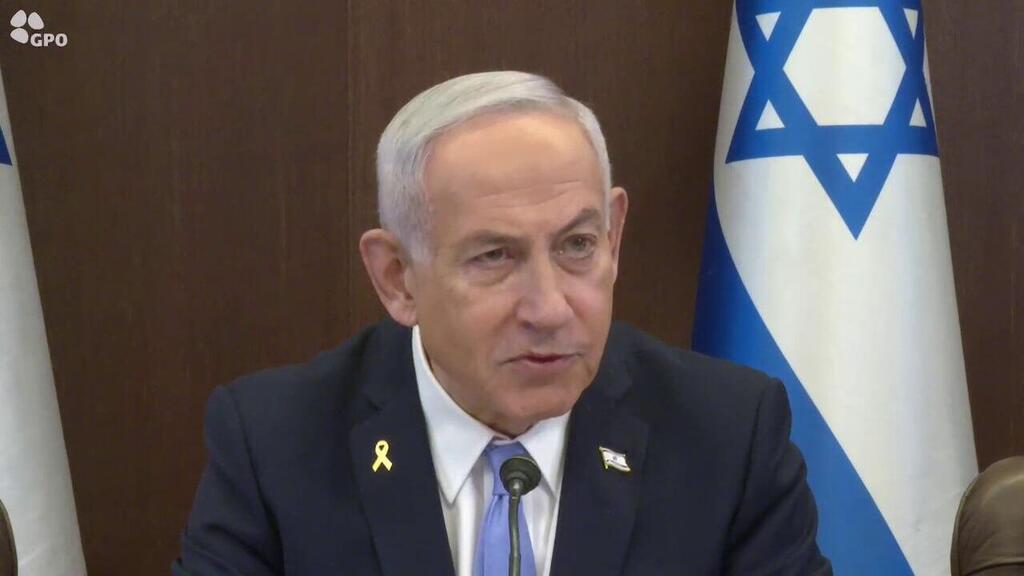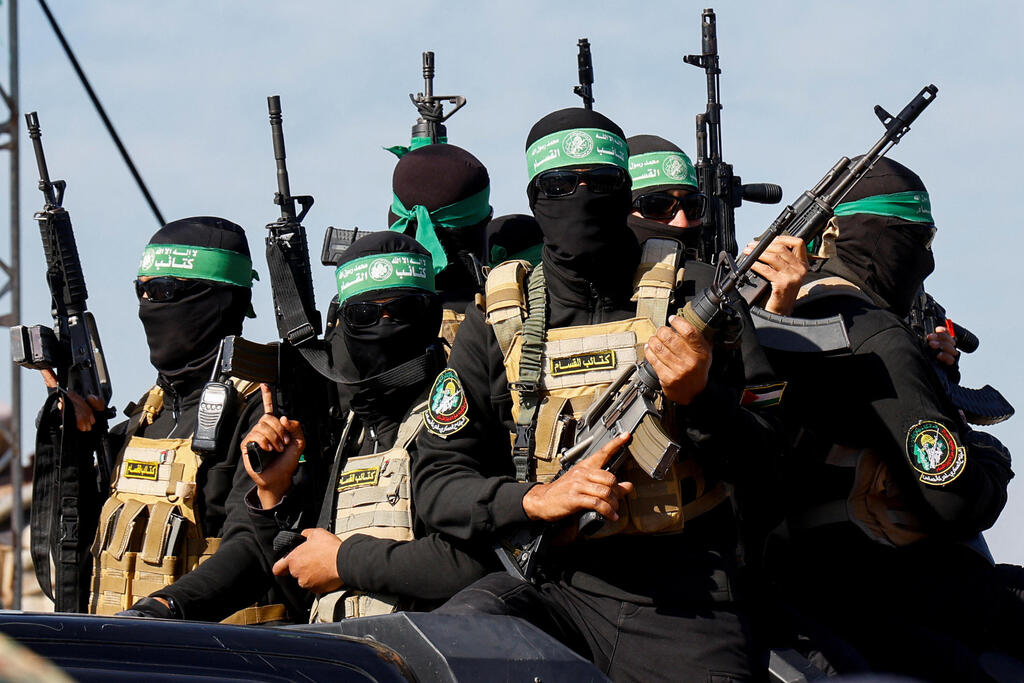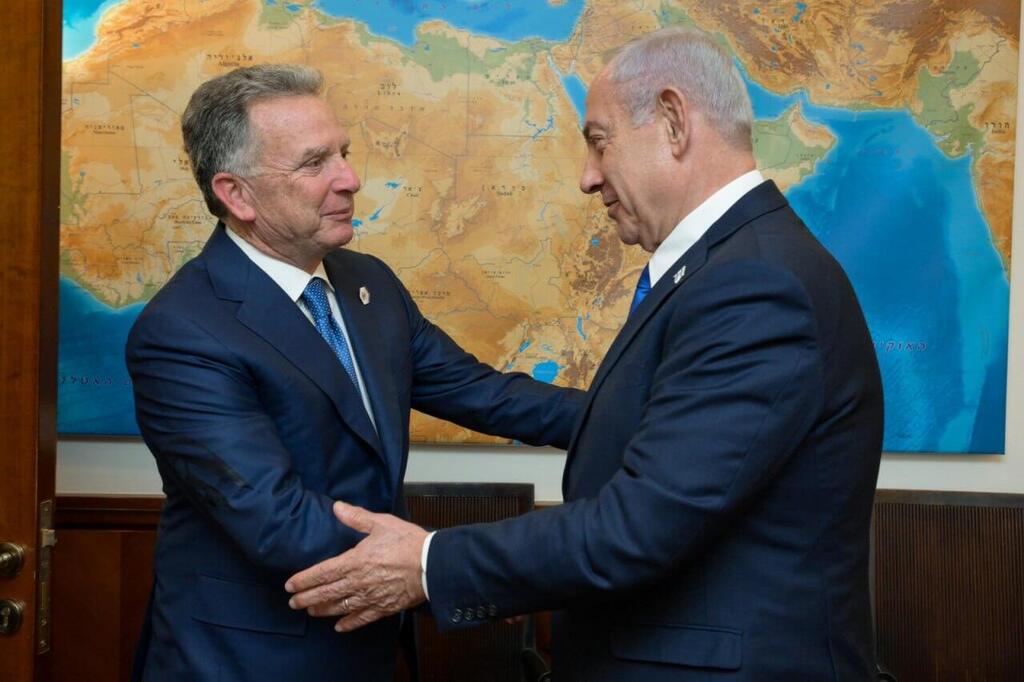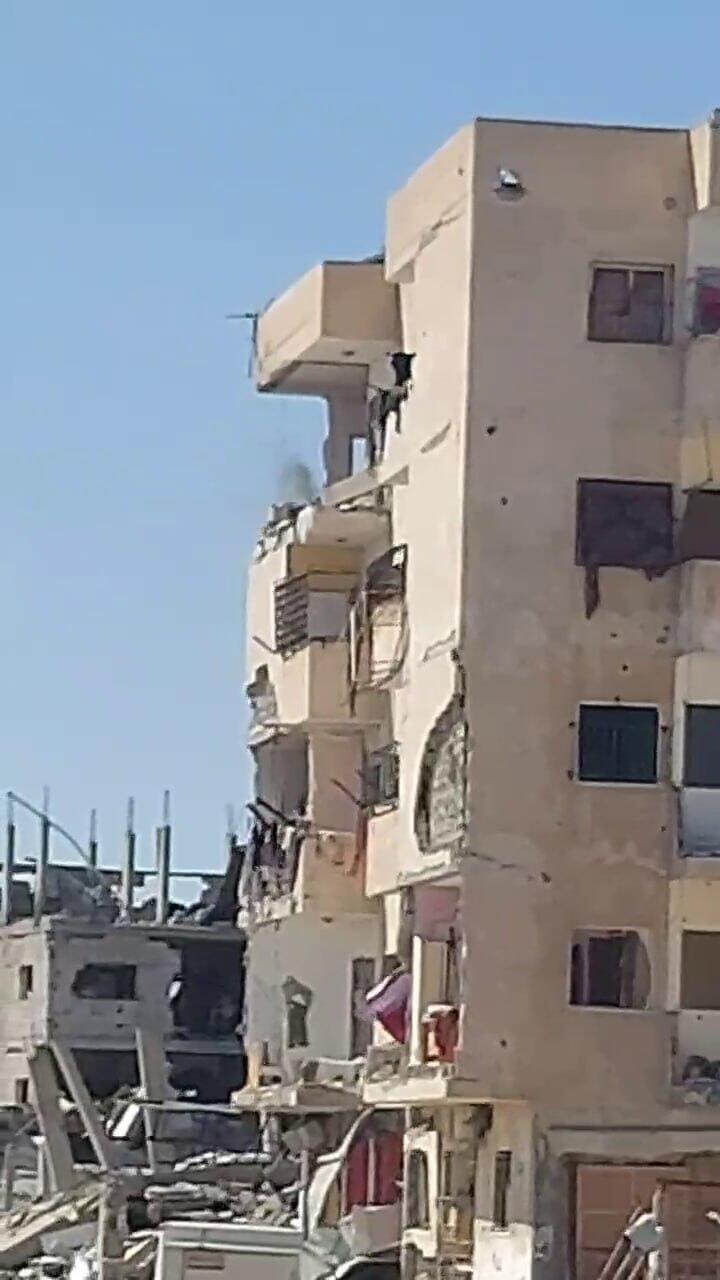Getting your Trinity Audio player ready...
Israel’s decision to suspend humanitarian aid to Gaza and adopt a cease-fire framework drawn up by U.S. President Donald Trump's Middle East envoy, Steve Wittkoff, followed failed negotiations with Hamas, according to reports in Arab media on Sunday.
Al Jazeera reported that before Prime Minister Benjamin Netanyahu ordered the aid cutoff, Israel proposed releasing five live hostages and ten bodies in exchange for Palestinian security prisoners and increased humanitarian aid. Hamas reportedly refused the offer.
6 View gallery


Tel Aviv rally calling for release of Hamas hostages; humanitarian aid trucks entering the Gaza Strip
(Photo: Moti Kimchi, AP Photo/Abdel Kareem Hana)
Behind the scenes, discussions took place between Israel and mediators, with the aid suspension reportedly coordinated with the U.S. According to the report, Israel demanded in the past 48 hours that Hamas release more hostages, both live and deceased, to extend the first phase of the deal and lay the groundwork for the second.
Hamas, however, insisted it would not release additional captives without progress toward Phase II—widely understood to include an end to the war. Hamas considers these new demands a violation of the original agreement and remains committed to its initial terms.
Addressing the aid suspension, Netanyahu told his Cabinet that Hamas would not receive “free meals” and that he would not allow the cease-fire to continue without the release of more hostages.
Meanwhile, Egypt strongly condemned Israel’s move, with its foreign minister accusing Israel of using starvation as a weapon. “Humanitarian aid cannot be used as a tool for collective punishment and starvation in Gaza,” said Egyptian Foreign Minister Badr Abdelatty.
Speaking alongside European Commissioner for the Middle East Dubravka Šuica at a press conference, Abdelatty called on Brussels to apply “greater pressure” on Israel to uphold the cease-fire agreement’s terms.
Netanyahu told his Cabinet that Israel’s decision to adopt Wittkoff’s proposed framework was made in full coordination with Washington. The plan calls for extending the temporary cease-fire by 50 days, through the end of Ramadan and Passover, and releasing all hostages in two phases—half at the start and half at the end—if terms for ending the war are agreed upon. Netanyahu said Wittkoff described his proposal as a “corridor to negotiations for Phase II,” and stressed, “Israel is ready for that.”
Netanyahu dismissed claims by media analysts that Israel is violating the original cease-fire deal with Hamas, arguing that negotiations for a permanent truce were supposed to begin on the 16th day of Phase I but have not yet taken place.
“Under the original agreement, Israel is allowed to resume fighting after day 42 if it determines negotiations are ineffective,” he said, adding that this clause was backed by a side letter from the previous U.S. administration and supported by the Trump administration. Despite this, he said, “we accepted Wittkoff’s plan because we are committed to bringing our hostages home.”
However, Netanyahu said Hamas has so far rejected the framework. “If Hamas changes its position, Israel will immediately enter negotiations to implement it,” he said. He warned that Israel would not allow an indefinite cease-fire without hostage releases: “There are no free meals. If Hamas thinks it can continue the cease-fire or enjoy Phase I conditions without returning hostages, it is gravely mistaken.”
Addressing Israel’s decision to halt humanitarian aid to Gaza, Netanyahu accused Hamas of hijacking incoming supplies. “Hamas is seizing all goods sent to Gaza, abusing the population, shooting at civilians trying to access aid and turning humanitarian relief into a terror budget against us. We will not tolerate this.”
Get the Ynetnews app on your smartphone: Google Play: https://bit.ly/4eJ37pE | Apple App Store: https://bit.ly/3ZL7iNv
Netanyahu also issued a veiled threat, saying, “If Hamas remains entrenched in its position and refuses to release our hostages, there will be further consequences—which I will not elaborate on here.”
Despite Netanyahu’s tough rhetoric, some Cabinet ministers said they did not get the impression Israel was eager to resume fighting, following a security briefing during the meeting. “I don’t think Hamas is interested in fighting right now, and I don’t think we are either—not in the immediate term,” one minister told Ynet.
However, ministers also noted that Hamas appeared unlikely to accept the Wittkoff framework. When asked about next steps after cutting humanitarian aid, officials indicated that electricity and water supplies to Gaza could be targeted next, but no specific decisions were detailed.
Meanwhile, Israeli airstrikes continued in Gaza on Sunday in response to violations of the cease-fire by Hamas, the IDF said.
Palestinian health officials reported four deaths from the strikes, bringing the total number of fatalities during the 42-day cease-fire to 116, according to Hamas-run health authorities.
The IDF confirmed one of the strikes targeted suspects planting explosives near Israeli forces in northern Gaza, saying, “The Air Force eliminated the suspects to neutralize the threat. The IDF will continue to act against any threat to Israeli citizens and its forces.” Palestinians also reported injuries from an airstrike on an apartment in Rafah’s Tel al-Sultan neighborhood.
Meanwhile, Egyptian officials, quoted by the Qatari newspaper The New Arab, said Cairo attempted to broker a compromise between Israel and Hamas. The proposal calls for extending the cease-fire by two weeks—far shorter than the 50-day extension proposed by Wittkoff and supported by Israel. In exchange, Israel would receive three living hostages and the bodies of three others.
According to Egyptian sources, an Israeli delegation was expected to arrive in Cairo for talks on the proposal, though Israeli officials later denied any such plans. "The report of an Israeli delegation traveling to Cairo today is incorrect. We have not received an Egyptian proposal," an Israeli official said. However, a separate report by Al Jazeera was not explicitly denied.
Egyptian Foreign Minister Abdelatty reiterated his condemnation of Israel’s suspension of humanitarian aid to Gaza, vowing to push forward negotiations on the next phase of the cease-fire agreement. "All remaining commitments under the agreement must be implemented, and negotiations for Phase II must begin," he said, while acknowledging that "political will is needed to move forward."
Early Sunday, following the formal end of the first phase of the hostage deal, Israel halted all humanitarian aid deliveries to Gaza and closed the border crossings. Netanyahu’s government approved the decision overnight amid stalled negotiations and Hamas’ refusal to accept the Wittkoff framework.
Humanitarian aid had been a key pressure tool for Israel throughout the war and is particularly critical during Ramadan. However, Israeli officials view the current aid freeze as largely symbolic, noting that Hamas has stockpiled supplies after receiving 25,200 aid trucks during the cease-fire. According to Israeli estimates, the terrorist group has enough provisions to last at least four months. Water is still being supplied to Gaza’s desalination plant, officials confirmed.
Truck lines at the Egyptian side of the Rafah crossing following the suspension of humanitarian aid to Gaza
(Video: Reuters)
6 View gallery


Truck lines at the Egyptian side of the Rafah crossing following the suspension of humanitarian aid to Gaza
(Photo: AFP)
The Prime Minister’s Office justified the aid suspension by citing Hamas’ rejection of further hostage releases under the proposed U.S.-backed deal. "With the end of Phase I of the hostage deal and Hamas’ refusal to accept the Wittkoff framework, which Israel agreed to, Prime Minister Netanyahu has decided to halt all aid deliveries to Gaza. Israel will not allow a cease-fire without hostage releases. If Hamas continues to refuse, there will be further consequences," the statement read.
The previously unknown Wittkoff framework, which Israel officially adopted after Netanyahu’s overnight discussions, proposes extending the cease-fire for 50 days—through the end of Ramadan and Passover. Under the plan, half of the remaining hostages in Gaza, both living and deceased, would be released at the beginning of the extension, with the rest freed on the final day if a permanent cease-fire agreement is reached.
According to Israeli estimates, Hamas and other Gaza-based terrorist groups currently hold 59 hostages, 35 of whom have been declared dead by Israel. Of the remaining 24, officials believe 22 are still alive.
Hamas swiftly rejected the proposal. In a statement to Al Arabiya, the group said: "Wittkoff’s plan to release half of the hostages is skewed in favor of Israel’s vision. It contradicts the Gaza cease-fire deal brokered by the U.S."
Palestinian Islamic Jihad also dismissed the proposal, accusing Netanyahu of "choosing a policy of starvation over honoring the cease-fire agreement."









